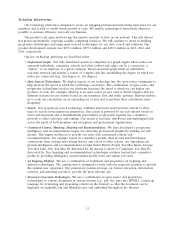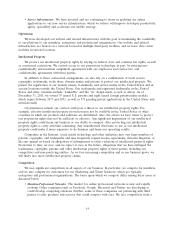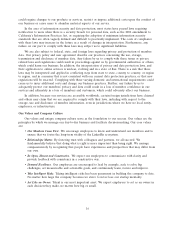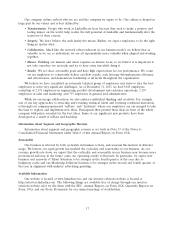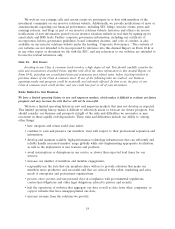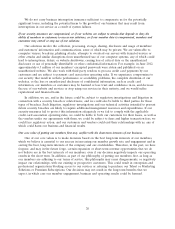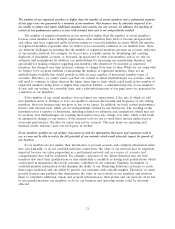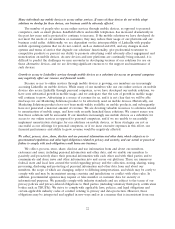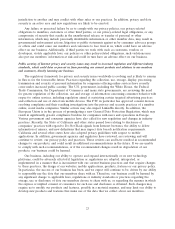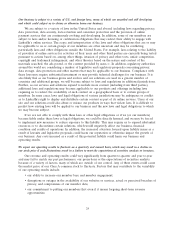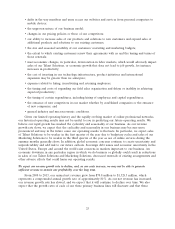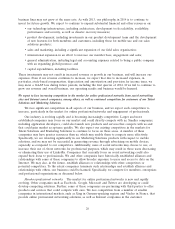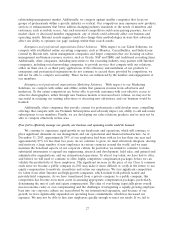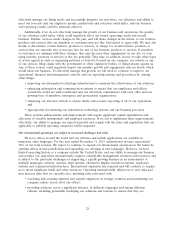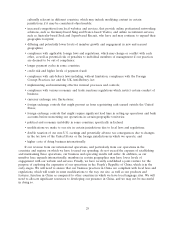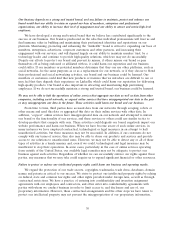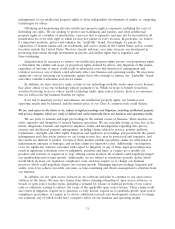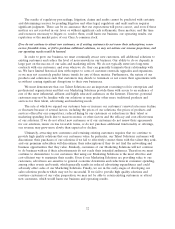LinkedIn 2013 Annual Report Download - page 24
Download and view the complete annual report
Please find page 24 of the 2013 LinkedIn annual report below. You can navigate through the pages in the report by either clicking on the pages listed below, or by using the keyword search tool below to find specific information within the annual report.Many individuals use mobile devices to access online services. If users of these devices do not widely adopt
solutions we develop for these devices, our business could be adversely affected.
The number of people who access online services through mobile devices, as opposed to personal
computers, such as smart phones, handheld tablets and mobile telephones, has increased dramatically in
the past few years and is projected to continue to increase. If the mobile solutions we have developed do
not meet the needs of our members or customers, they may reduce their usage of our platform and our
business could suffer. Additionally, we are dependent on the interoperability of LinkedIn with popular
mobile operating systems that we do not control, such as Android and iOS, and any changes in such
systems and terms of service that degrade our solutions’ functionality, give preferential treatment to
competitive products or prevent our ability to promote advertising could adversely affect engagement and
monetization on mobile devices. As new devices and new platforms are continually being released, it is
difficult to predict the challenges we may encounter in developing versions of our solutions for use on
these alternative devices, and we are devoting significant resources to the support and maintenance of
such devices.
Growth in access to LinkedIn’s services through mobile devices as a substitute for access on personal computers
may negatively affect our revenue and financial results.
Because access to online services through mobile devices is growing, our members are increasingly
accessing LinkedIn on mobile devices. While many of our members who use our online services on mobile
devices also access LinkedIn through personal computers, as we have developed our mobile solutions, we
have seen substantial growth in mobile usage, and we anticipate that the rate of growth in mobile usage
will continue to grow. Advertising is a source of revenue for us, and it is not clear that we will be able
find ways for our Marketing Solutions product to be effectively used on mobile devices. Historically, our
Marketing Solutions products have not been made widely available on mobile products, and subsequently
have not generated a material amount of revenue. We are devoting valuable resources to solutions related
to monetization of mobile usage, and have only recently launched these solutions. We cannot assure you
that these solutions will be successful. If our members increasingly use mobile devices as a substitute for
access to our online services as opposed to personal computers, and if we are unable to successfully
implement monetization strategies for our solutions on mobile devices, or these strategies are not as
successful as our offerings for personal computers, or if we incur excessive expenses in this effort, our
financial performance and ability to grow revenue would be negatively affected.
We collect, process, store, share, disclose and use personal information and other data, which subjects us to
governmental regulations and other legal obligations related to privacy and security, and our actual or perceived
failure to comply with such obligations could harm our business.
We collect, process, store, share, disclose and use information from and about our members,
customers and users, including personal information and other data, and we enable our members to
passively and proactively share their personal information with each other and with third parties and to
communicate and share news and other information into and across our platform. There are numerous
federal, state and local laws around the world regarding privacy and the collection, storing, sharing, using,
processing, disclosing and protecting of personal information and other data from and about our
members, the scope of which are changing, subject to differing interpretations, and which may be costly to
comply with and may be inconsistent among countries and jurisdictions or conflict with other rules. In
addition, governmental agencies may request or take member or customer data for security or
informational purposes. We generally comply with industry standards and are subject to the terms of our
privacy policies and privacy-related obligations to third parties (including voluntary third-party certification
bodies such as TRUSTe). We strive to comply with applicable laws, policies, and legal obligations and
certain applicable industry codes of conduct relating to privacy and data protection. However, these
obligations may be interpreted and applied in new ways and/or in a manner that is inconsistent from one
22



